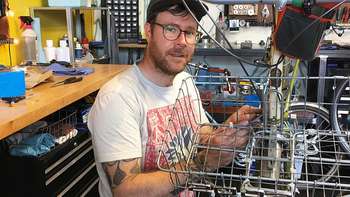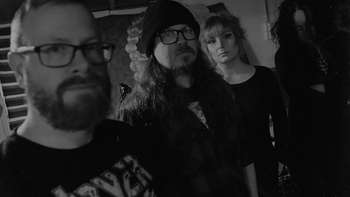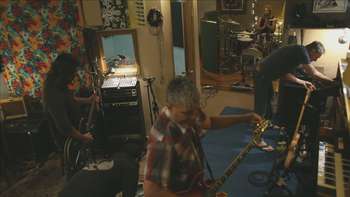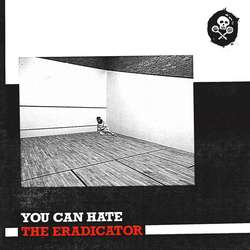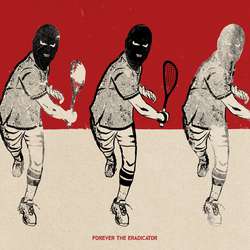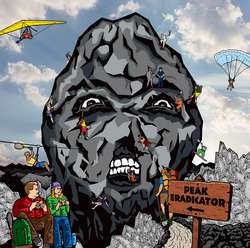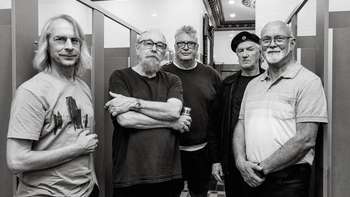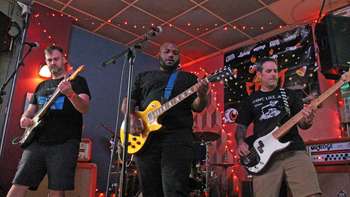The rock star image of packed arenas, traveling with an entourage, and partying amid crazy backstage antics and endless drama is almost patently false. Sure, it’s reflective of a few artists from yesteryear who have platinum records and shortened lifespans, but most musicians have day jobs – and not just to pay the bills. Jobs provide new challenges, personal fulfillment and, yes, some rent or gas money.
And usually when somebody is writing a new record or scheduling a tour, they have to balance that with their job.
How an artist spends their time by day will influence the creative process at night. In Don’t Quit Your Day Job, Scene Point Blank looks at how musicians split their time, and how their careers influence their music – or, alternately – how their music provides escape.
In this installment we chat with Andy Slania, better known as The Eradicator, a Chicago-area band that has given new life to a timeless Kids in the Hall sketch.
Here he is, unmasked.

Scene Point Blank: What do you do for a living? What is your official job title?
Andy Slania: I've been in the IT industry for about a decade, and my job title is Customer Success Manager.
Scene Point Blank: When did you decide on this career path? Did that happen before or after you were a musician?
Andy Slania: I went to college for music business, because I wanted to start or work for a record label. Who would've thought that I could have just saved my money and blown it on putting out records, which I also did, in addition to paying for college.
I was fortunate enough to do internships while in school which lead to a job after school, which was that foot in the door to being a Customer Service Rep at Shure (the Chicagoland based microphone manufacturer). I worked at Shure for 13 years and was able to transition in and out of internal departments, where I found an interest in supporting and maintaining configuration within the company's ERP and CRM applications.
Scene Point Blank: What’s the biggest challenge in balancing your career with your music?
Andy Slania: Considering the subject nature of the band, and my role in the band, I see the biggest challenge as dividing my personal self with my work self as these are polar opposites. One of my favorite Onion articles of all time is "Find The Thing You're Most Passionate About, Then Do It On Nights And Weekends For The Rest Of Your Life". Since what I do for work is so different than what I do outside of work, having that divide is helpful yet it is challenging as I fear my co-workers may view me in a different light if finding out about my personal passion outside of work. Even though I've never run into an issue with it and have worked in great organizations with great people, it's not always easy to try to convince someone you're not a maniac when you spend weekends putting on a mask and screaming at people about a sport they don't play or understand.
Scene Point Blank: How do you find time to tour and write?
Andy Slania: This is a mixture of information management as well as the "Just Do It" approach. For my songwriting process, I think of a song title, write it down in an Evernote file, then conceptualize a part of the song that goes with the title. I then go into my practice space where I will drive myself mad for hours trying to come up with a song, record it, then listen back to it to adjust the parts that I'm not thrilled with.
For touring, I try to balance the weekends approach-for shows, and take vacation if doing a block of shows during the week.
Scene Point Blank: At your job, do you encounter stereotypes about musicians?
Andy Slania: For the most part no, but there are some people in the world who will always have preconceived stereotypes about the "rock star" lifestyle.
Scene Point Blank: Do you ever talk music with your employer or coworkers? Do others have similar tastes as you?
Andy Slania: It depends, of course. Co-workers will sometimes have stereotypes about musicians, but those musicians more often than not also have stereotypes about their co-workers. I've found that the "don't judge a book by its cover" reigns true in some situations. Since I worked for a company that is rooted in music for many years, there were often people who did have very similar tastes which is a great way to find common ground with those I needed to spend a lot of time with.
Scene Point Blank: Have your experiences from making music or touring influenced your day job in any surprising ways?
Andy Slania: Absolutely. As the primary person behind a band, you are essentially a small business owner. If you find any iota of success, you will need to leverage any skills as a small business owner in order to remain successful and viable. These lessons can be directly linked to the work place if you are in an industry where that is an option.
Scene Point Blank: What advice would you give to others who might be interested in IT?
Andy Slania: If you're a nerd who is interested in the complexity of how things work, then being in a technical field such as IT or Engineering is not only challenging but rewarding. As well, there are many ways to get to that eventual career path. I didn't go to school for it, but found that starting at an entry level position at a company gets your foot in the door, and you can do what you make of it to find out what you want to do for a career.
The Eradicator released Peak Eradicator last year on Say-10 Records.



